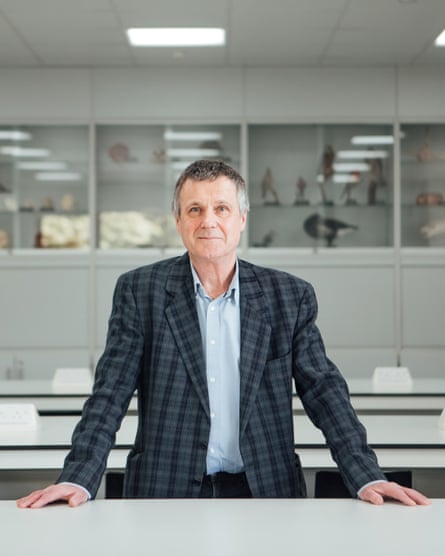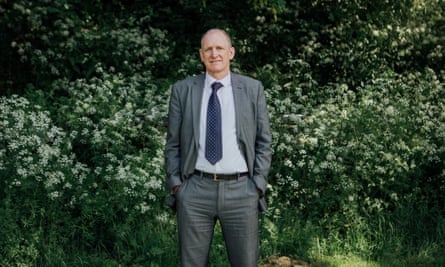Human disease and environmental devastation: these two blights have long served as vivid metaphors for each other – from the poetry of Lucretius and the imagery of Edgar Allan Poe to the uncanny physical resemblance between trees and lung capillaries.
But are bodies and nature more than just metaphors? As humanity grapples with myriad ecological and health crises, from ocean pollution to obesity, it can sometimes be useful for scientists and researchers to consider the parallels between the two arenas – the causes of affliction, the consequences, as well as potential remedies.
Myra Conway, a professor of biomedical science at the University of Derby, says that, at some levels, she sees similarities between many of the dangers facing the planet and metabolic imbalances seen in patients with a serious, progressive illness. In some instances, such as coral bleaching – which was found to have affected 91% of the reefs surveyed along the Great Barrier Reef in 2022 – Conway can see parallels with dysregulated signalling pathways in illnesses such as Alzheimer’s disease, her own research speciality, and also with cancer. With both diseases, particular triggers – which could be related to either genetics or lifestyle choices – reprogramme the body’s cells in a way that ultimately leads to disease.
“When you look at the data that colleagues from the University of Derby are collecting on the corals dying on the world’s reefs, you see this apparent reprogramming of the cells. This is considered a protective mechanism from the coral to try to sustain and preserve itself in response to climate change, but it shifts to being toxic,” says Conway – who leads an active research term focusing on redox biochemistry, ageing, neurodegeneration and biomarker development. “In a very similar way, the brain attempts to protect itself from imbalances in metabolism, but this function can turn toxic, leading to damaged neurons.”
These kinds of parallels and cross-learnings between different fields of study are not always obvious and require thinking outside the box. But part of the reason they can be so fruitful is because of the sheer complexity and intractability of many of today’s most pressing global problems. This increasingly requires people to join forces across different divides – whether national, ideological, or different fields of study.
For instance, tackling obesity requires people from different disciplines (science and medicine to psychology and behavioural economics) to collaborate to figure out strategies for addressing the overconsumption of heavily processed foods. Likewise, addressing the overuse of plastics is a complex problem that requires collaboration between material scientists, marine biologists, and economics and business.

The need for increasingly novel and multidisciplinary approaches has exciting implications when it comes to human inquiry – for undergraduates, researchers and academics alike. Conway notes that the way in which we tackle major global issues is increasingly going to involve people from lots of different disciplines. “We can no longer tackle these problems through just one expertise alone,” she says. “The integration of different disciplines from biology and machine learning to psychology is going to be fundamentally important for us to solve challenges ranging from dementia to climate breakdown. Because of this, it’s a wonderful time to be a student right now. There’s more and more focus on giving students that wider vision so that they can go on to address these issues, whether it’s health, climate, economic or social, from a bigger perspective.”
Conway highlights how the medical world is already proving a source of inspiration for therapies that could help organisms adapt more effectively to their changing environment. The gene-editing technology CRISPR, which is being explored as a way of removing defective genes responsible for the blood clotting disorder haemophilia or tweaking immune cells to help them recognise cancer, is also being used to make crops such as wheat or sugarcane more resilient to droughts.
Conway is intrigued by research exploring how CRISPR or probiotics might be able to improve the amount of carbon that plants take from the atmosphere, tackling global warming by drawing the excess carbon down and stashing it underground. “Probiotic treatments could even be used to help sustain seagrass, one of the largest stores of carbon in the marine environment, dying due to increased sea surface temperature (climate change). This is likely occurring by the reprogramming of cells from a destructive pathway, to help them heal again,” she says. “It’s similar to the gut microbiome in humans where probiotics are being studied to see if they can help reprogramme the body from a harmful, inflammatory state.”
Finding novel ways of treating and managing these problems is important, but Conway stresses that preventing them from developing in the first place is key – both for the planet and the human body.
Undergraduates at the University of Derby are encouraged and empowered to come up with novel approaches to researching problems. The university provides forums for facilitating this, including an Undergraduate Research Scholarship Scheme that gives all second-year students the chance to take part in a funded and supported research project.
Do you have an idea for a novel research project or course syllabus that could supercharge humanity’s efforts to save the world? The University of Derby is challenging 16- to 24-year-olds to submit a short proposal, with the chance to win £1,000, and to partner with its academics to develop a MOOC (massive open online course). Find out more at derby.ac.uk
One other area where insights from different disciplines is becoming more crucial is when it comes to shifting public behaviour, convincing policymakers, and pressuring corporations into action. James Elander, professor of health psychology at the University of Derby, says that psychology has a major role to play in this, and we can learn a lot from the years of research that ultimately helped shift attitudes towards smoking.
“We had all of these public information campaigns trying to make people understand the risks, which had marginal benefits,” he says. “Then the government banned smoking in public places, a major policy change that led to a much bigger change in people’s behaviour and significant health benefits. This, and other examples, encouraged psychologists to become more active in arguing for policy changes to improve people’s environments in ways that affect their health, not just trying to change individual beliefs or attitudes.”
Elander – who is an expert in the behavioural and psychological aspects of pain management and pain medication use in chronic conditions such as haemophilia and sickle cell disease – notes that another example is food and diet, “where changes in food standards and availability of healthy food will probably achieve greater health benefits than campaigns to change individual beliefs and attitudes to food and eating.”
He adds: “Psychologists at Derby, including professor Miles Richardson, are also conducting research to improve people’s connections to the natural environment, with benefits in terms of human wellbeing and mental health but also in terms of pro-environmental behaviour.”

In more recent years, the fields of psychology and behavioural economics have provided important insights for those trying to fix pressing problems. Insights from therapeutic approaches can also be useful. Both Elander and Prof Neil Fowler, associate provost learning and teaching at the University of Derby, have spent years exploring how forms of psychotherapy, such as acceptance and commitment therapy (ACT), can aid people suffering from chronic pain. Elander believes that ACT can play a role in helping people focus more on the context and function of their thoughts and feelings, and their relationships with their social and natural environments, rather than on their individual thoughts and feelings. This broad approach could help people to feel more connected to the communities in which they live, and also the natural world around them.
“A big strand of ACT is helping people to reconnect with their values, what is important to them, what they want to do with their lives and orientating them towards those things and away from their distress,” he says. “This kind of approach shifts the focus from the inner life of the individual towards their relationship with the world around them. So far it has been used mainly to help people with different kinds of mental and physical health problems, but it could also potentially be adapted to help people feel more connected with nature, with benefits for their own wellbeing and resilience, and also for the planet.”
In the coming years, Fowler predicts that lessons from health psychology will have an important role to play in terms of the messaging surrounding the climate crisis. Pain experts have shown that depending on our personality disposition, different people will respond to the same message in different ways. “When you see a news article about how whales and sea turtles are affected by plastic waste, do you focus on the catastrophe or how this problem could be solved by better recycling?” he says. “And that will have an impact upon whether that person decides to become an activist for change because they’ve focused on the positive aspects of the story or whether they become disengaged because they feel that the world is lost. Understanding how best to reach people to feel empowered to make a difference is very important.”
Do you have an idea for a novel research project or course syllabus that could supercharge humanity’s efforts to save the world? The University of Derby is challenging 16- to 24-year-olds to submit a short proposal, with the chance to win £1,000, and to partner with its academics to develop a MOOC (massive open online course). Find out more at derby.ac.uk
Stay connected with us on social media platform for instant update click here to join our Twitter, & Facebook
We are now on Telegram. Click here to join our channel (@TechiUpdate) and stay updated with the latest Technology headlines.
For all the latest Education News Click Here
